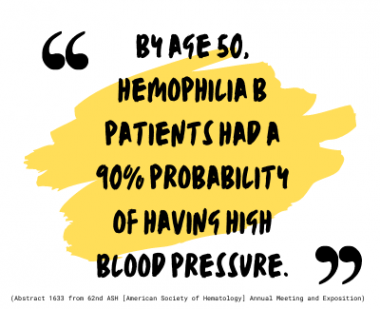Heart Disease, an Increasing Problem for Those With Hemophilia

Heart disease is the No. 1 killer of women. Yet all of the studies I found on hemophilia and heart disease have studied only men. But essential lessons for women are in these studies, too. Today, National Wear Red Day, which symbolizes support for women’s heart health, is a good opportunity to look more closely at some of these lessons.
Heart disease hits close to home
In 2002, at age 58, my dad passed away. He and my mom were on vacation with friends in Mexico when my dad, finishing a swim in the ocean, was seen staggering and clutching his chest. He fell face-first into the water. The autopsy from Mexico said his heart stopped. We will never know for sure what caused his death, but in all likelihood, it was a heart attack.
I am approaching the age at which my dad passed. I recently had coffee with a friend when I felt an odd discomfort in my chest. The pain went away, but it was a wake-up call. I visited a cardiologist, and now I am on blood pressure and cholesterol medication.
Risk factors common in hemophilia
I used to believe that hemophilia protected me from heart disease, as my blood is naturally “thin.” But research has shown that hemophilia does not protect against heart disease. According to the World Federation of Hemophilia, heart disease is an increasing cause of death in people with hemophilia.
Hemophilia patients are more susceptible to certain risk factors for heart disease, such as high blood pressure and obesity, than the general population. A study published in 2013 found that the prevalence of high blood pressure in patients with hemophilia older than 18 was 49.1% compared with 31.7% in the general population. Another study showed that by age 50, hemophilia B patients had a 90% probability of having high blood pressure.
High blood pressure also increases the risk of bleeding into the brain tissue, known as an intracerebral hemorrhage. Treatment of an intercerebral hemorrhage is hugely challenging in people with an increased tendency to bleed.
Further, clotting factors used to treat hemophilia can expose one to high factor levels. High factor levels can trigger increased clot formation, something I have experienced personally. Clots can lead to fatal strokes, heart attacks, or pulmonary embolisms. Some medicines used to prevent or treat these conditions affect blood clotting, and someone with hemophilia can bleed more on these medicines.

(Graphic by Jennifer Lynne)
Take action now
Detection and aggressive treatment of obesity, high blood pressure, and cholesterol are essential for those with hemophilia. Know your numbers. My blood pressure and cholesterol levels had been creeping up for decades until I decided to take action.
The American Heart Association has eight tips to reduce your risk for heart disease and stroke:
- Get active. Aim for 2.5 hours of moderate physical activity each week — about 20 minutes of walking each day. Always start an exercise program slowly.
- Manage your cholesterol. Start with diet and lifestyle changes. If your doctor thinks you need medicine, take it.
- Eat better. Make half your plate fruit and vegetables. Eat fish twice a week and fiber-rich whole grains every day. Limit salt and sugary drinks. I am following a plant-based vegan diet.
- Manage blood pressure. High blood pressure has no symptoms. Know your blood pressure and take steps to lower it if it’s too high.
- Lose weight if you are overweight. Losing even 10 pounds lowers your risk of heart disease.
- Lower blood sugar. Diabetes is not a friend of the heart. When blood sugar is too high, this increases the risk of heart disease by four times.
- Stop smoking to help prevent heart disease, cancer, and chronic lung disease.
- Get a good night’s sleep. For adults, that means seven to nine hours each night.
Be sure to ask for help. Check with your hemophilia treatment center (HTC) team for advice about the American Heart Association’s tips to prevent heart disease. For example, your HTC physical therapist can give you examples of the right kinds of exercise for you.
Do your heart a favor and ask your hematologist or doctor about your risk of developing heart disease. And look for me today, as I’ll be wearing red.
Note: Hemophilia News Today is strictly a news and information website about the disease. It does not provide medical advice, diagnosis, or treatment. This content is not intended to be a substitute for professional medical advice, diagnosis, or treatment. Always seek the advice of your physician or another qualified health provider with any questions you may have regarding a medical condition. Never disregard professional medical advice or delay in seeking it because of something you have read on this website. The opinions expressed in this column are not those of Hemophilia News Today or its parent company, Bionews, and are intended to spark discussion about issues pertaining to hemophilia.







Leave a comment
Fill in the required fields to post. Your email address will not be published.